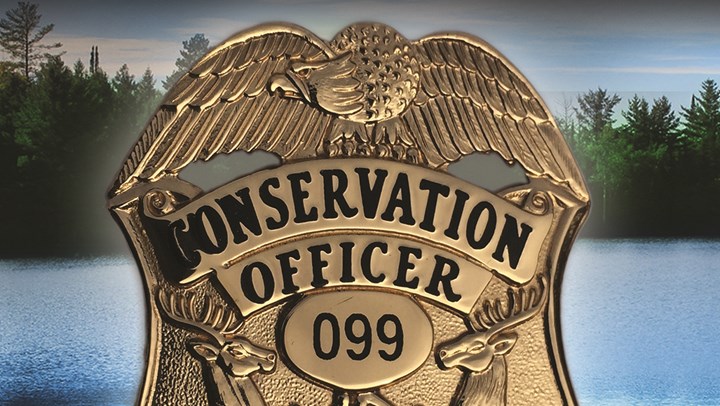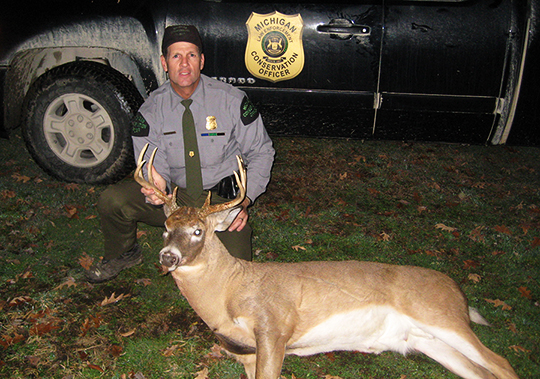
by John Borkovich, author and retired Michigan conservation officer - Tuesday, June 27, 2017

As every NRA member can attest, certain cherished values, customs and beliefs are passed down from generation to generation. Hunting, shooting and outdoor activities are part of our American heritage and lineage. In the 21st century, there is a growing trend in our country to retain our connection to outdoor sporting activities and to care for and preserve our fish, wildlife and natural resources. This "care for" attitude has become almost an obsession and represents America’s strong conservation movement. As we face the many cultural, technological and demographic changes in today’s world, arguably at no time in history has there been more awareness and interest in preserving and protecting our natural resources.
This conservation movement seems to be fueled by our love for animals. That love is evident in the way we love our pets. Most of us cherish our dogs, cats, horses and other "pets" as we strive to properly care for and love our animal friends. Millions of dollars are spent on their care and welfare each year and countless hours are spent enjoying time with them. The same love and compassion that we have for our domestic pets is contained in our hearts for wild animals, birds and fish.
Loving and respecting our wildlife and its habitat is what this conservation movement represents. The vast majority of Americans are good, caring stewards of the land and our wildlife. Most people, through their respect for our wildlife, are almost self-policing when it comes to interacting with our outdoor world. Most people use their love for nature to guide them to treat our natural resources with respect.
The conservation movement is exemplified by all of the support given to our conservation officers, fish and game wardens and police who protect our wildlife. Many people are interested and almost fascinated with the work that fish and wildlife officers perform. Just look at the popularity of TV shows such as “North Woods Law,” “Rugged Justice,” “Lone Star Law” and “Wardens.”
The same interest, love, respect and appreciation is what led me to a career in conservation law enforcement. As a Michigan conservation officer for 27 years, I have dedicated my life to the cause of preserving and protecting our natural resources. My hope is that through my dedicated work, I can help ensure that future generations will be able to enjoy our beautiful outdoor world. My mission of protecting our wildlife and natural resources has been an all-consuming ordeal. I worked hard on behalf of honest, nature-loving people. As an officer, I realized that I needed to have compassion for those who hunt, fish, target shoot and interact with our natural resources. In the case of a game-law violation, I also recognized that each situation must be assessed to try and understand why someone committed the given violation. Because the vast majority of people respect and cherish our wildlife, officers also need to respect and appreciate those who participate in outdoor recreation."Loving and respecting our wildlife and its habitat is what this conservation movement represents. The vast majority of Americans are good, caring stewards of the land and our wildlife."
I once had contact with a tree-cutting expert who climbed up 100 feet into a dead hemlock tree. The fearless man climbed the tree with ease and agility as he carried a chainsaw and methodically cut down the tree. All during the process, the man worked without the help of ropes or by using safety nets below him. When he was safely back on the ground, he said, “Hello John,” and proceeded to tell me that he had always wanted to be a conservation officer. But then the man with the chainsaw said he could not do my job because it was too dangerous due to the fact that everyone he would come in contact with would have guns. I explained that while many people who conservation officers deal with do carry guns, that in itself does not make public contacts dangerous. Almost all of the great Americans who hunt and target shoot never commit a crime and pose no threat to fish and game officers.
Of course, when the criminal element of society uses guns, the whole equation changes. When criminals illegally use or possess guns, both public and officer safety become an issue as noted in a story in my recently published book, "Wildlife 911: On Patrol." The story, titled "Saturday Night Special," describes how a felon tried to shoot me with an illegally-obtained .380 pistol—and, yes, he lost. Law enforcement officers must safely and aggressively target those who harm society or do harm to or destroy our natural resources.
Many of us officers endure the danger of dealing with criminals with guns on a regular basis. However, through all of the felony arrests, gun fights, car chases and otherwise dangerous encounters, officers need to somehow remember to treat law-abiding hunters, outdoor enthusiasts and the general public with dignity and respect.
So for all of you great citizens who cling to your guns, religion, family and the U.S. Constitution, I am forever on your side. Many of the stories in my book mention God, guns, family and country and may not be politically correct to some misguided people. But to all of our legal gun owners and sportsmen and women who enjoy our natural outdoor heritage and work to protect it for future generations, I am firmly committed to respecting you as I work to preserve and protect our natural resources.
■ ■ ■
About the Author
The love and admiration of nature is what led author John Borkovich to become a wildlife conservation officer, dedicating himself not only to enjoying and respecting our natural wildlife resources but also to protecting them. John graduated with honors from Michigan State University in 1980 with a bachelor's degree and assumed his role as a Michigan conservation officer in 1985. A firearm instructor and member of the state Department of Natural Resources’ Firearms Transition Team, John went on to serve as a field training officer for conservation officer recruits and an instructor at the Conservation Officer Police Academy at Michigan State Police (MSP) headquarters in Lansing. He became an adjunct professor in the St. Clair County Community College’s criminal justice department where he developed two course curriculums and taught its Conservation Law Enforcement and Environmental Law Enforcement classes.

John’s many awards include being named Shikar-Safari International’s Wildlife Officer of the Year (previously awarded to his brothers, Mike and Bruce) and the National Wild Turkey Federation’s Michigan Officer of the Year. He has received lifesaving awards, safe driving awards, recognition for his "Fit for Duty" performances and has been recognized by the MSP and the St. Clair County Sheriff Department. John currently serves as a police officer for the Yale and Lexington Police Departments.
Editor's Note: NRAHLF.org is pleased to announce the arrival of John Borkovich’s new book, “Wildlife 911: On Patrol.” To order your copy and see inside the life and times of an all-American conservation officer, please visit John’s website, wildlife911officer.com. The cost of the book is $19.95 and can be purchased through PayPal with any major credit card or by calling (810)-523-2103.
E-mail your comments/questions about this site to:
[email protected]
